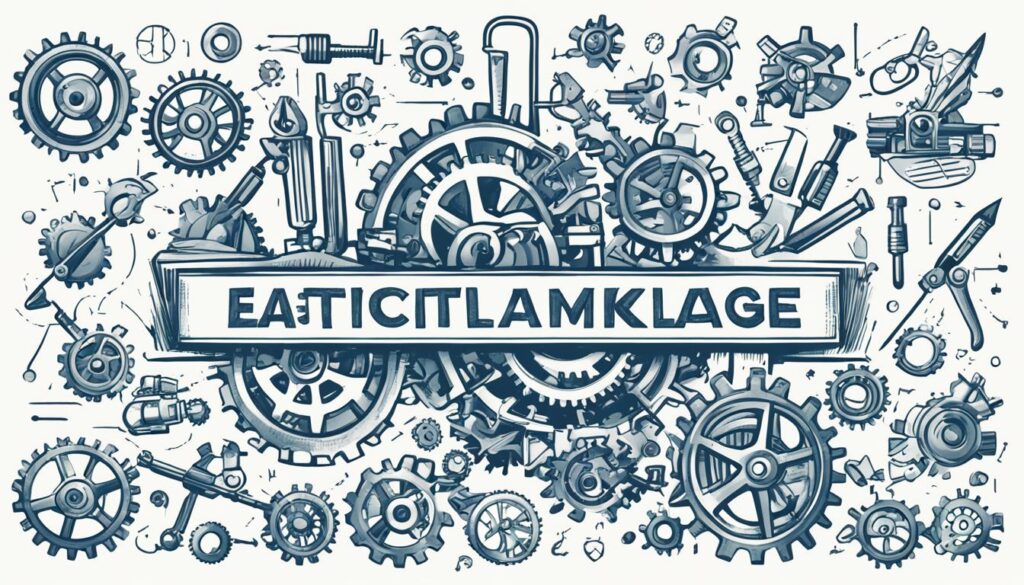Table of Contents
When making decisions, do you rely more on your internal principles and logical analysis or on practicality and goal-achievement? The way we think and approach tasks can vary significantly from person to person. Introverted thinking (Ti) and extroverted thinking (Te) are two cognitive functions that play a crucial role in shaping our thinking preferences and decision-making styles.
In this article, we will dive into the distinctive dynamics of introverted thinking and extroverted thinking, comparing them on nine key points and exploring how they impact the way we analyze information, make decisions, and interact with the world. Whether you lean towards introverted thinking or extroverted thinking, understanding your thinking style can provide valuable insights into your cognitive processes and enhance your ability to navigate complex situations.
Key Takeaways:
- Introverted thinking (Ti) focuses inward on principles and logical analysis.
- Extroverted thinking (Te) focuses outward on tasks and practical solutions.
- Ti excels at analyzing conceptual breakdowns, while Te excels at strategizing logical organization.
- Ti makes decisions grounded in theory, whereas Te makes decisions for measurable goal achievement.
- Ti pursues deep understanding, while Te prioritizes the accumulation of applicable knowledge.
1. Ti focused inward on principles vs Te focused outward on tasks
Extroverted thinking (Te) is characterized by its focus on tasks in the outer world. Extraverted thinkers are action-oriented and practical, utilizing logical reasoning and problem-solving strategies to accomplish measurable goals. They excel in organizing and structuring their environment, relying on established systems and processes to streamline tasks and maximize efficiency. Decisions made by extroverted thinkers are driven by a desire to optimize effectiveness and productivity in real-world scenarios.
On the other hand, introverted thinking (Ti) is directed inward, with a strong emphasis on principles and internal frameworks. Introverted thinkers dedicate their mental energy to introspection and logical analysis, examining ideas from multiple angles to ensure logical consistency. They value intellectual honesty and strive to maintain internal rationality in their thoughts and actions. Rather than being focused on the external world, introverted thinkers dive deep into conceptual exploration and understanding.
To illustrate the contrasting approaches of Ti and Te, consider the following example:
- An extraverted thinker may be tasked with improving a business process. They would focus on analyzing the existing workflow, identifying bottlenecks, and implementing changes to enhance efficiency. This practical approach would involve seeking input from team members, utilizing problem-solving strategies, and working towards measurable improvements.
- In contrast, an introverted thinker faced with the same task would delve into a detailed analysis of the underlying principles and theories behind the process. They would explore the logic and rationale behind each step, seeking to identify potential flaws or areas for improvement based on their deep understanding of the subject matter.
These examples highlight how extroverted thinking emphasizes tangible results and the external environment, while introverted thinking prioritizes logical reasoning and introspective exploration.
| Introverted Thinking (Ti) | Extroverted Thinking (Te) |
|---|---|
| Focused inward on principles | Focused outward on tasks |
| Analyzes ideas from multiple angles | Utilizes logic and problem-solving for task accomplishment |
| Values internal rationality and logical consistency | Emphasizes effectiveness and productivity in the real world |
| Pursues deep understanding of concepts | Excels in organizing and structuring the environment |
| Decisions based on theoretical frameworks | Decision-making driven by measurable goal achievement |

2. Ti analyzing conceptual breakdowns vs Te strategizing logical organization
When it comes to analyzing complex ideas and concepts, introverted thinking (Ti) and extroverted thinking (Te) approach the task in different ways.
Introverted thinkers excel at conceptual breakdowns, employing their natural ability to deconstruct intricate ideas into their component parts. They meticulously examine the underlying logic, searching for inconsistencies and discrepancies within the conceptual framework. This process allows introverted thinkers to gain a deep understanding of the subject matter, exploring its nuances and intricacies.
On the other hand, extroverted thinkers emphasize logical organization and strategizing. They use their problem-solving abilities and analytical skills to create structured and efficient systems. Extroverted thinkers focus on optimizing productivity and effectiveness, identifying the most logical and practical ways to organize information, tasks, and resources.
Let’s illustrate these differences with an example:
Imagine a group of individuals tasked with developing a marketing campaign for a new product. An introverted thinker in the group would naturally gravitate towards analyzing the underlying concepts and ideas behind the product. They would dive deep into understanding the target audience, market trends, and the core values that the campaign aims to convey. By breaking down these conceptual elements, they can develop a comprehensive and well-thought-out strategy.
In contrast, an extroverted thinker would focus on strategizing the logical organization of the campaign. They would coordinate team efforts, divide tasks, and establish a clear timeline to ensure efficiency. They would prioritize measurable goals, such as generating leads or increasing sales, and develop strategies that align with these objectives. The extroverted thinker’s aim would be to organize the campaign in a way that maximizes its impact and drives tangible results.

Let’s take a closer look at the distinct strengths of extroverted thinking in the context of logical organization:
| Extroverted Thinking (Te) | Introverted Thinking (Ti) |
|---|---|
|
|
“Extroverted thinkers excel in strategizing logical organization, using their organizational skills to optimize productivity and streamline processes.”
Extroverted thinkers’ efficiency-oriented mindset and ability to see the big picture make them highly effective at transforming ideas and information into actionable plans. They possess a knack for identifying the most efficient ways to organize and utilize resources to achieve their goals. Te users are skilled at managing complex projects, coordinating teams, and implementing practical strategies to drive success.
By contrast, introverted thinkers (Ti) focus more on analyzing conceptual breakdowns and examining the logical consistency of ideas. They excel in dissecting complex information, identifying logical fallacies, and gaining deep insights. Ti users enjoy exploring the intricacies of concepts, often immersing themselves in intellectual pursuits to gain a thorough understanding.
3. Ti decisions grounded in theory vs Te decisions for measurable goal achievement
Introverted thinkers, also known as Ti users, base their decisions on theoretical frameworks and logical analysis. They prioritize consistency and coherence in their thinking, striving to make choices that align with their internal principles and theories. When faced with a decision, introverted thinkers carefully weigh different options, considering the logical implications and potential consequences of their choices.
For example, let’s say you’re an introverted thinker faced with the decision of whether to pursue a new job opportunity. You would likely approach this decision by analyzing the theoretical aspects, such as how the new role aligns with your long-term career goals, the fit with your personal values, and the potential for intellectual growth and development.
- Introverted thinkers ground their decisions in theory and logical consistency.
- They prioritize analyzing the alignment of choices with their internal principles.
- Ti users carefully weigh options and consider potential consequences.
- On the other hand, extroverted thinkers (Te) focus on measurable goals and tasks.
- Te users emphasize effectiveness and efficiency in decision-making.
- They strategize and take action to accomplish tasks and achieve desired outcomes.
To visually illustrate the differences between Ti and Te decision-making, let’s take a look at the following table:
| Ti (Introverted Thinking) | Te (Extroverted Thinking) | |
|---|---|---|
| Focus | Internal principles and theories | Measurable goals and tasks |
| Decision-Making Criteria | Logical consistency and alignment with principles | Effectiveness and efficiency in achieving goals |
| Approach | Carefully weighing options and considering logical implications | Strategizing and taking action to accomplish tasks |
| Example | Deciding on a new job opportunity based on long-term career goals and personal values | Choosing a project plan that maximizes efficiency and achieves desired outcomes |
Let’s consider a team tasked with developing a new marketing campaign:
- A Ti-driven decision-maker may spend significant time analyzing market research, consumer behavior theories, and the campaign’s alignment with the company’s core values. They focus on creating a campaign that resonates intellectually with the target audience.
- In contrast, a Te-driven decision-maker would prioritize defining measurable goals for the campaign, such as increasing sales or brand awareness. They would then develop a practical strategy and take action to achieve those goals, evaluating success based on tangible results.
Ultimately, the decision-making approach of introverted thinkers and extroverted thinkers reflects their distinct thinking preferences and cognitive processes. While Ti users seek logical coherence and theoretical grounding, Te users strive for measurable goal achievement and practical outcomes.
4. Ti pursuit of deep understanding vs Te accumulation of applicable knowledge
While introverted thinkers (Ti) are driven by the pursuit of deep understanding and intellectual curiosity, extroverted thinkers (Te) prioritize the accumulation of applicable knowledge that can be immediately put into practice. Ti users thrive by delving into complex subjects, analyzing them from multiple angles, and uncovering the underlying principles that govern them.
In contrast, Te users focus on acquiring practical knowledge that is directly relevant to their problem-solving and goal achievement. They gather information that can be immediately applied to their tasks and strive for efficiency in learning. Te users prioritize acquiring knowledge that has real-world utility to maximize their effectiveness in solving problems and achieving desired outcomes.

Example:
Imagine you are a software developer working on a coding project. As an introverted thinker (Ti), you would be inclined to immerse yourself in the underlying principles of programming languages, analyzing their syntax and structures to gain a deep understanding of how they work.
On the other hand, as an extroverted thinker (Te), you would prioritize accumulating applicable knowledge that directly contributes to your coding skills. You would focus on learning specific coding techniques and frameworks that enable you to solve practical problems efficiently in your project.
| Introverted Thinking (Ti) | Extroverted Thinking (Te) |
|---|---|
|
|
5. Ti independent idea debate vs Te organized group effort debate
Introverted thinkers thrive in independent idea debates. They enjoy exploring ideas and concepts on their own, unrestricted by external influences. Ti users value intellectual autonomy and prefer the freedom to think critically and analyze ideas without the influence of others. They excel in generating unique insights and making innovative connections.
“In independent idea debates, introverted thinkers have a distinct advantage. Their ability to engage in deep introspection and analysis allows them to explore ideas from multiple angles, uncovering new insights and connections that may have been overlooked. This intellectual autonomy allows introverted thinkers to take full ownership of their thought processes and generate truly original ideas.”
When engaged in an independent idea debate, introverted thinkers bring their introverted thinking (Ti) function to the forefront. This thinking function enables them to examine ideas and concepts in-depth, analyzing them through the lens of their internal framework of principles and logical analysis.
For example, imagine a team working on a project that requires brainstorming ideas and making decisions. An extroverted thinker would actively engage the entire team, encouraging each member to contribute their insights and perspectives. They would facilitate a discussion, allowing the team to debate different ideas and come to a collective decision.
During an independent idea debate, introverted thinkers demonstrate the following characteristics:
- Engage in introspection and deep thinking
- Value intellectual autonomy and independence
- Think critically and analyze ideas from multiple angles
- Generate unique insights and make innovative connections
The table below highlights the contrasting approaches of independent idea debate (Ti) and organized group effort debate (Te), showcasing how introverted and extroverted thinkers differ in their collaborative decision-making and team dynamics:
| Introverted Thinking (Ti) | Extroverted Thinking (Te) |
|---|---|
|
|
Introverted thinkers in an independent idea debate bring a valuable perspective to the table. Their capacity to generate novel insights and approach ideas from a unique angle can lead to breakthroughs and innovative solutions.
6. Ti identifying flaws in reasoning vs Te improving inefficient processes
One of the key distinctions between introverted thinking (Ti) and extroverted thinking (Te) is their approach to problem-solving. Ti users have a remarkable ability to identify flaws in reasoning, while Te users excel in improving inefficient processes.
Introverted thinkers, with their critical thinking and logical analysis skills, have a keen eye for spotting inconsistencies and weaknesses in arguments or ideas. They have a natural inclination to dissect complex information and uncover logical fallacies, enabling them to make more informed and rational judgments. For example, when presented with a scientific study, an introverted thinker might critically examine the research methodology, data analysis, and conclusions, identifying any flaws in reasoning or potential biases.
On the other hand, extroverted thinkers focus on improving inefficient processes. They have a knack for identifying areas that can be optimized to enhance efficiency and productivity. Te users are solution-oriented problem solvers who excel at streamlining workflows and eliminating unnecessary steps. For instance, in a business setting, an extraverted thinker might review the organizational structure and identify redundancies, proposing changes to improve efficiency and achieve better results.
“Introverted thinkers are skilled at logical analysis, identifying flaws in reasoning, and uncovering logical fallacies.”
| Introverted Thinking (Ti) | Extroverted Thinking (Te) |
|---|---|
| Identifies flaws in reasoning | Improves inefficient processes |
| Spotlights logical fallacies | Streamlines workflows |
| Critical thinking skills | Solution-oriented mindset |
| Examines arguments for inconsistencies | Identifies areas for optimization |
| Unveils biases and false assumptions | Eliminates unnecessary steps |
The contrasting strengths of introverted thinking and extroverted thinking highlight the diverse ways in which individuals approach problem-solving. Whether it’s identifying flaws in reasoning or improving inefficient processes, both cognitive functions contribute valuable perspectives to decision-making and problem-solving processes.
7. Ti novelty through logical connections vs Te innovation through problem-solving strategies
Introverted thinkers possess a remarkable capacity to bring novelty through logical connections. They have a unique ability to make unexpected connections between seemingly unrelated concepts, generating creative ideas and unique insights. Ti users think outside the box and find innovative solutions by exploring alternative perspectives and making logical leaps.
For example, imagine an introverted thinker who is passionate about environmental sustainability and urban planning. They may come up with a novel idea to integrate green spaces and renewable energy sources into existing city infrastructure, creating a more sustainable and livable urban environment. Their ability to connect concepts from different domains, such as ecology and urban design, leads to innovative solutions that address complex challenges.
The introverted thinker’s creative thinking process involves analyzing patterns, synthesizing information, and making logical associations to generate unique and unconventional ideas. Their approach is not bound by traditional thinking or limited by existing frameworks, allowing them to explore alternative possibilities and discover innovative solutions.
On the other hand, extroverted thinkers foster innovation through problem-solving strategies. They excel at finding practical solutions to complex challenges, employing their resourcefulness and practicality to address problems efficiently. Te users leverage their problem-solving skills and strategic thinking to drive innovation and create practical, real-world solutions.

For instance, consider an extraverted thinker who works in product development. They may identify a recurring customer pain point and use their problem-solving skills to design a new feature or functionality that addresses the issue. Their innovative thinking stems from a deep understanding of user needs and a strategic approach to problem-solving.
Iintroverted thinkers bring novelty through logical connections, utilizing their ability to make unexpected associations and generate unique insights. On the other hand, extroverted thinkers foster innovation through problem-solving strategies, leveraging their resourcefulness and strategic thinking to drive practical solutions. Both approaches contribute to the overall creativity and innovation of individuals and organizations.
8. Ti prefers feedback on logical consistency vs Te prefers feedback on effectiveness improvement
When it comes to receiving feedback, introverted thinkers (Ti) and extroverted thinkers (Te) have different preferences. Introverted thinkers value feedback that focuses on logical consistency and reasoning. They appreciate constructive criticism that helps them identify any inconsistencies or weaknesses in their ideas.
For an introverted thinker, feedback that highlights logical flaws can be invaluable in refining their thought processes and enhancing the overall logical coherence of their thoughts. Constructive criticism centered around reasoning allows Ti users to make adjustments and strengthen their arguments, leading to more robust and logically sound conclusions.
On the other hand, extroverted thinkers (Te) prefer feedback that emphasizes effectiveness improvement. Te users value constructive feedback that focuses on the practical outcomes and the impact of their actions. They appreciate suggestions for optimizing efficiency, enhancing productivity, and achieving better results in a more effective manner.
For example, consider a Ti user who presents a logical argument. They would prefer feedback that analyzes the logical coherence of their reasoning and identifies any gaps or inconsistencies. In contrast, a Te user who proposes a new process would value feedback that suggests ways to improve its efficiency, streamline steps, and achieve better outcomes.
Feedback that helps extroverted thinkers identify areas of improvement in their processes and strategies can be highly valuable. By receiving feedback on effectiveness, Te users can refine their decision-making styles, problem-solving approaches, and organizational skills to achieve greater efficiency and success.
| Introverted Thinking (Ti) | Extroverted Thinking (Te) |
|---|---|
|
|
Ultimately, whether feedback is centered around logical consistency or effectiveness improvement, both introverted thinkers and extroverted thinkers can benefit from constructive criticism that helps them grow and develop their thinking preferences and cognitive processes.
9. Ti distressed by disordered systems vs Te distressed by lack of efficiency progress
Introverted thinkers, or individuals with introverted thinking (Ti) as their dominant cognitive function, are distressed by disordered systems. They thrive in environments that have clear structures and logical frameworks. Ti users feel overwhelmed and frustrated when faced with chaos or a lack of organization. They have a strong desire for order and coherent systems that align with their internal principles and logical reasoning.
For example, imagine a situation where an introverted thinker is assigned to work in a disorganized office space with files scattered everywhere, no clear processes or protocols, and constant interruptions. This chaotic environment can disrupt their workflow and hinder their ability to focus and make decisions based on their logical analysis. The lack of structure and order can create a sense of unease and inefficiency for introverted thinkers.
On the other hand, extroverted thinkers, or individuals with extroverted thinking (Te) as their dominant cognitive function, are distressed by a lack of efficiency progress. They feel frustrated when they encounter situations that are inefficient or hinder their productivity. Te users have a strong drive for optimization and continuous improvement, and they strive to eliminate obstacles and streamline processes to achieve better results.
For instance, consider a scenario where an extraverted thinker is working in a company that has outdated systems and processes that are slowing down their ability to complete tasks efficiently. The lack of progress and the inefficiency of the systems can be frustrating for extroverted thinkers, as they value practicality and results. They are motivated by making things more efficient, and they strive to find ways to improve productivity and eliminate any unnecessary steps.
In summary, while introverted thinkers are distressed by disordered systems, extroverted thinkers are distressed by a lack of efficiency progress. Understanding these preferences and the impact they have on individuals can contribute to better workflow management and create environments that cater to the unique needs of different cognitive styles.
FAQ
What is the difference between introverted thinking (Ti) and extroverted thinking (Te)?
Introverted thinking (Ti) and extroverted thinking (Te) are cognitive functions in the Myers-Briggs Type Indicator (MBTI) that represent different thinking preferences. Ti is focused inward on principles, relying on an internal framework of logical analysis and introspection. Te, on the other hand, is focused outward on tasks in the external world, using logic and problem-solving strategies to achieve measurable goals.
How do introverted thinkers approach decision-making?
Introverted thinkers base their decisions on theoretical frameworks and logical analysis. They value consistency in their reasoning and consider the logical implications and potential consequences of their choices.
What is the strength of introverted thinking?
Introverted thinkers excel at analyzing conceptual breakdowns. They have a natural ability to deconstruct complex ideas, examine the underlying logic, and search for inconsistencies.
How do extroverted thinkers approach decision-making?
Extroverted thinkers make decisions with a focus on achieving measurable goals. They are practical and results-oriented, considering the tangible outcomes of their choices.
What is the strength of extroverted thinking?
Extroverted thinkers excel in strategizing logical organization and creating efficient systems. They have a natural ability to see the big picture and identify the most effective ways to organize information, tasks, and resources.
How do introverted thinkers pursue understanding?
Introverted thinkers have a strong desire to pursue deep understanding. They delve into complex subjects, exploring them in great depth to grasp underlying concepts and principles.
How do extroverted thinkers acquire knowledge?
Extroverted thinkers focus on the accumulation of applicable knowledge. They gather information that is relevant to their goals and tasks, seeking practical knowledge that can be immediately applied to solve problems and achieve desired outcomes.
How does introverted thinking engage in idea debate?
Introverted thinkers thrive in independent idea debates. They enjoy exploring ideas and concepts on their own, unrestricted by external influences, and excel in generating unique insights and making innovative connections.
How does extroverted thinking engage in idea debate?
Extroverted thinkers excel in organized group effort debates. They thrive in collaborative environments, engaging with others to discuss ideas and reach decisions. They leverage collective expertise and diverse perspectives to enhance their decision-making processes.
How does introverted thinking identify flaws in reasoning?
Introverted thinkers have a keen ability to identify flaws in reasoning. They excel in critical thinking and logical analysis, spotting inconsistencies and weaknesses in arguments or ideas.
How does extroverted thinking improve inefficient processes?
Extroverted thinkers are adept at improving inefficient processes. They have a talent for identifying areas of improvement and implementing changes to enhance efficiency and productivity.
How does introverted thinking bring novelty?
Introverted thinkers bring novelty through logical connections. They have a unique ability to make unexpected connections between seemingly unrelated concepts, generating creative ideas and unique insights.
How does extroverted thinking foster innovation?
Extroverted thinkers foster innovation through problem-solving strategies. They excel at finding practical solutions to complex challenges, employing their resourcefulness and practicality to address problems efficiently.
What kind of feedback do introverted thinkers prefer?
Introverted thinkers prefer feedback that focuses on logical consistency. They appreciate constructive criticism centered around their thought processes and reasoning.
What kind of feedback do extroverted thinkers prefer?
Extroverted thinkers prefer feedback that highlights effectiveness improvement. They value constructive feedback focused on practical outcomes and the impact of their actions.
What distresses introverted thinkers?
Introverted thinkers are distressed by disordered systems. They thrive in environments that have clear structures and logical frameworks and feel overwhelmed and frustrated when faced with chaos or a lack of organization.
What distresses extroverted thinkers?
Extroverted thinkers are distressed by a lack of efficiency progress. They feel frustrated when they encounter situations that are inefficient or hinder their productivity.